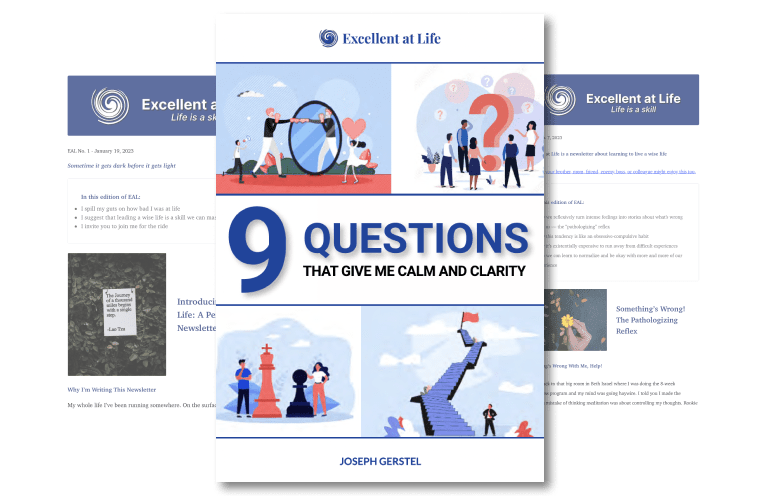How I Realized I Could Train My Mind and Found Myself Chanting Alone in a Dark Closet
It was a weird thing to be doing. I was sitting in a dark closet filled with cassette tapes chanting “Ribbono shel olam” (Hebrew for “master of the universe”). It was my first attempt at a mantra meditation, or any meditation for that matter, and it all started with the purchase of a peculiar book on a trip to Brooklyn.
I don’t remember why I was in Brooklyn or what possessed me to go look for the book, but whatever it was I wound up in a local Judaica store buying a small softcover copy of a book called Jewish Meditation. I was 19-years old and studying Torah in a yeshiva (a religious Jewish seminary) in Queens at the time and clearly seeking something. For my young mind, it proved to be a very interesting read.
I soon found myself hunting for a private space where I could experiment with the somewhat mystical meditative techniques in the book — a place with a working lock on the door that would prevent inopportune discovery and immediate and infinite ridicule by my peers. (Hey, the Torah says you should love your friend like yourself, but unfortunately for my sake, it didn’t clearly spell out that means you shouldn’t ridicule me when I’m being weird 😊.)
I ended up cajoling my way into that tape closet by convincing the character that managed it to lend me the key. After some brief experimentation, God appeared to me and after keeping his words to my chest for 17 years, I am now going to share with you the tenets of the true religion.
No, I’m kidding. God didn’t show up. I already told you I made sure there was a good lock on the door and I wasn’t going to risk peer ridicule to the caprices of a deity. Besides, I don’t need God to help me invent a religion, I’m quite capable of doing it on my own, thank you. And maybe he was already there with me already anyway.
I don’t remember how many sessions I did in that tape closet, but one seed took root in my mind and has continued to root itself more and more deeply over the years, kind of like the positive version of the last sliver of the Morgul blade Elrond removed from Frodo in Rivendell (if you’re not a Lord of the Rings person, you should go fix that immediately); it was the idea that you could train your mind. And oh boy, did my mind need training.
But there were things I wish I knew then, things I might whisper to my younger self in that dark closet if I could get past that carefully locked door. Things that are kind of the opposite in many ways of how I was approaching things back then.
Whispers. Soft whispers.
Softly, Softly
There is a certain softness with which we are born, a certain completely unaffected simplicity. We welcome the soft reassurance of being close to our mothers, of kind touch, gentle affection. We greet the world with an unsuspicious friendliness. We don’t yet know the expectations of others. We don’t yet feel the compulsion to adopt false selves to please or placate these others. We don’t yet know right and wrong, should and shouldn’t.
I think if I had to define being excellent at life, I might say that it is learning to live consciously from this place of simplicity, this undefended presence that if we have any continuously existing self from birth to death, this is it.
Over time, the scars of life teach us to start pretending. We smile to incur this person’s favor, study hard to prevent that person’s displeasure. We walk on eggshells so this hair-triggered elder doesn’t get angry (and this catering to bad behavior is often seen as a virtue), we lie so that inflexible teacher doesn’t punish us. We hide our true wants so this bully stops picking on us, chase that accolade so these friends respect us. Tens of times a day. Hundreds of times a week. Thousands of times a year. Habits accrue. Ruts deepen. Patterns establish.
All this pretending results in so many impulses in our heads, so many contradictory attempts to be so many things. It’s a lot of dissonance, a lot of fragmentation. We’ve put on so many costumes so many thousands of times that our simple softness is easily missed in this maelstrom of identities. We’ve donned these clothes so many times that we’ve forgotten we are not them.
When I sat down alone in the dark tape closet, I didn’t know it but I was trying to rediscover who I was amidst all this pretense, trying to find a way to work with this chaos. But I was trying to do it then by imposing more control, by attempting to tighten up my attention and coercing my mind to focus.
Softness unlocks the doors. The soft, holding attention of a mother to her infant. The gentle smile of a father to a child. Our own smile to ourselves. Softness calms the mind. It calms our activated nervous system, reduces our sense of being under threat. As the body calms, the mind clears, even if just a little bit.
We’re super addicted to doing, accomplishing, getting places. I needed to leave this at the door of the closet, but it was locked inside with me. If we’re to tune our minds effectively, if we’re to learn to be excellent at life, we need to dial back our efforts to control.
Instead, we need to rediscover our softness, our innate friendliness and simplicity, and gently turn it inwards and dial it way, way up. This is alien at first, embarrassing even. We’re so used to the harshness with which we treat ourselves, so used to walling ourselves off from the world.
But the last thing this engine needs is more pressure in the system. The last thing we want to add to the chaos of disparate selves is another attempt to be something new. We tune our minds by easing up, by softening.
Whispers. Soft whispers. Whispers have a way of carrying you know. Maybe they even carry through time back to dark tape closets.
Maybe even through locked doors.
Joseph
P.S. A Closing Note on Mysticism
When I wrote the first draft of this, I was very eager to run quickly from my mystical meditative experiments and talk about how I ultimately chose to pursue more simple things like focus, connection, and equanimity. But I see now that I was rushing to get to writing about that out of embarrassment that I’d come off as some flighty spiritualist.
There is a part of us that is called to the transcendent, to a sense that we are a part of something timeless, something greater. Slow music in particular brings this up for me (and I think for many others). I find the most powerful moments in my life in the depth of feeling evoked by these states (and I am very curious about the possibility of making them more consistently present).
Religious experience (done well) often taps into this sense of elevation, of mystery, of sacredness, and I think it is a shame that modern life offers few opportunities to be carried away by its power. Whether it actually tells us anything about something beyond this world or not, it is a core part of who we are. We do not have to believe in a particular framework nor build ideological edifices in order to avail ourselves of it.
If we are to experience deep meaning in our lives, it is important that we find ways to touch this elevation, both in deliberately structured environments and even more so in the mundane moments of our lives. It is only so that we can get lost in the beauty of life.
Maybe I shouldn’t run from it so fast.
Joseph



